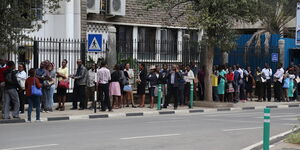The Court of Appeal has directed the Judicial Service Commission (JSC), led by Chief Justice Martha Koome, to ensure all courts adhere to the two-thirds gender rule.
Lawyer Adrian Njenga filed the case initially at the High Court in 2016, challenging the legality of the Supreme Court's composition.
The High Court rejected his case prompting him to file an appeal at the appellate court.
In the litigation, JSC petitioned the appellate court, arguing that the gender issue was not a primary consideration in appointments.
However, the court quashed the argument, ruling that it was wrong for JSC to overlook the gender principle in 2016 when recruiting Chief Justice (now retired) David Maraga, who joined retired judge Jackton Ojwang and Justices Isaac Lenaola, Smokin Wanjala and Mohamed Ibrahim.
Their female counterparts then were Deputy Chief Justice Philomena Mwilu and Lady Justice Njoki Ndung'u.
However, the current apex court is properly constituted, with four male judges, Justices Isaac Leanola, Smokin Wanjala, Ibrahim Mohamed, and William Ouko and their three female colleagues, CJ Koome, her deputy Philomena Mwilu and Njoki Ndung'u.
The court further stated that 12 years after the promulgation of the 2010 Constitution, JSC ought to ensure that in the exercise of its mandate of recruitment, the two-thirds gender principle is complied with.
Speaking to Kenyans.co.ke, Constitutional lawyer Charles Kanjama stated that the application of the two-thirds gender rule litigation has been a contentious subject since 2012.
“The issue of the two-thirds gender rule has been litigated since 2012 with the process seeking the application of the rule in Parliament, the Supreme Court and the Executive,” he clarified.
Kanjama further detailed that the matter was discussed from the junior courts to the appellate, with lawyers and stakeholders seeking clarification on loopholes.
"Two-thirds gender rule has been prosecuted in various courts, what this means is that a third of seven gives in the range of two while two-thirds gives four, however to a minimum of either gender is three," he added.












